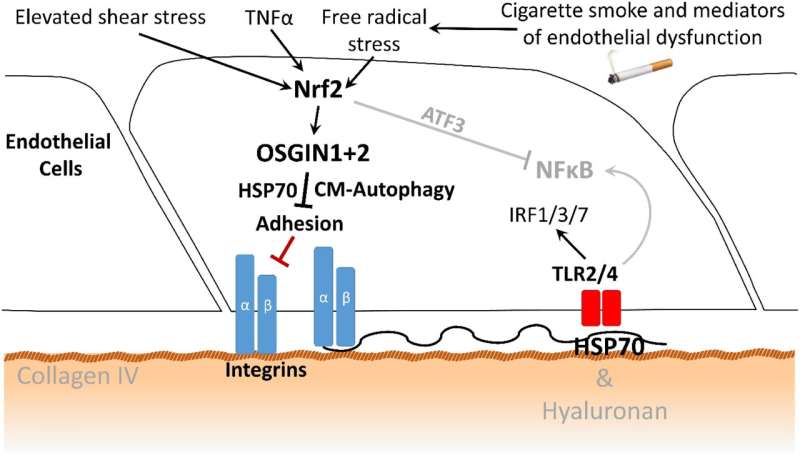This article has been reviewed according to Science X's editorial process and policies. Editors have highlighted the following attributes while ensuring the content's credibility:
fact-checked
peer-reviewed publication
trusted source
proofread
Smoking-triggered heart attacks could be prevented—new research explains how

One of the most common types of heart attack could be prevented thanks to new research that explains the process behind them for the first time.
A new study, led by Manchester Metropolitan University, has allowed researchers to put forward recommendations for possible drug therapies to prevent heart attacks caused by plaque erosion, which has not been possible before.
Around 30% of heart attacks are caused by plaque erosion, where the inner lining of blood vessels—known as the endothelium—detaches.
The endothelium provides protection to the blood vessels so when it falls away the blood starts to clot, which can then trigger a heart attack.
Plaque erosion is most commonly seen in younger individuals, smokers and women, which is why this type of heart attack is believed to be increased by lifestyle factors including smoking.
It was previously unknown what was happening inside the blood vessel that was causing the cells to fall away, but the study, published in Cardiovascular Research, has now uncovered the process.
Dr. Stephen White, Reader in Cardiovascular Pathology at Manchester Metropolitan University, said, "This type of heart attack is more common in younger people and in smokers and we used this information to unpick the mechanism and decipher what happens during plaque erosion."
"Our findings show a completely new mechanism that links cell stress caused by smoking—and potentially other factors like air pollution—with a defect in how the cells hold on to the underlying structures."
"This is significant, as now we have a better understanding of how these cells behave and why these types of heart attacks are being caused, we can start to find ways to help individuals avoid them in the future."
"We have in fact already been able to propose two strategies for developing drug treatments as a result of our findings."
Researchers discovered that a mechanism designed to sense and protect from the damage caused by smoking, can in fact go in overdrive and interfere with cell adhesion.
Loss of endothelial cells from the artery ultimately triggers the blood to clot, blocking the coronary artery and starving the heart of oxygen.
Chemicals in cigarette smoke were used to test this theory and were found to supercharge the process. Scientists say it's possible other factors, including air pollution, could have a similar effect.
Professor Tom Johnson, Consultant Cardiologist at the Bristol Heart Institute, said, "Heart attacks remain a leading cause of death, so extending our understanding of the mechanisms underlying plaque erosion provide hope for the prevention of future events."
"Increased awareness of plaque erosion as a cause of heart attack within the cardiology community is also valuable, as treatment can be tailored to the patient, avoiding the need for stents."
For the study, researchers used information from patients to create a tissue culture model of the blood vessel.
Tissue culture is a method of research, which sees biological tissue or cells grown in an artificial environment.
Scientists then recreated the blood flow environment found at sites of erosion in their models, as endothelial cells react differently depending on the blood flow patterns they are exposed to.
This allowed the endothelial cells to be studied in a laboratory, and for the impact cigarette smoke had on them to be analyzed.
To corroborate their findings, researchers matched genes that changed in the tissue culture model, with markers found in the blood of patients that had experienced a plaque erosion.
Future work will expand the understanding of this pathway and test new drugs to prevent this process from triggering heart attacks.
More information: Sandro Satta et al, A Nrf2-OSGIN1&2-HSP70 axis mediates cigarette smoke-induced endothelial detachment: implications for plaque erosion, Cardiovascular Research (2023). DOI: 10.1093/cvr/cvad022




















